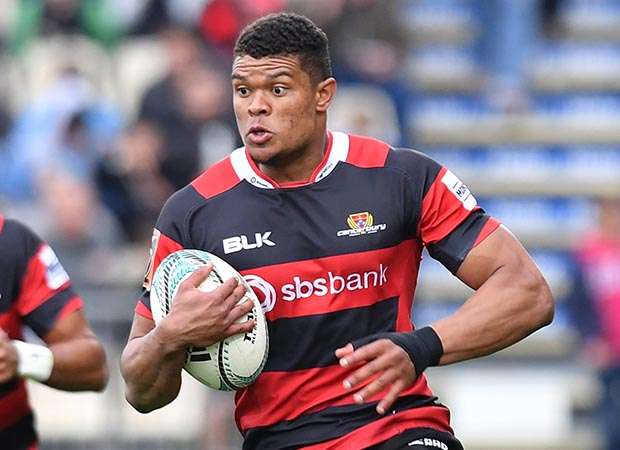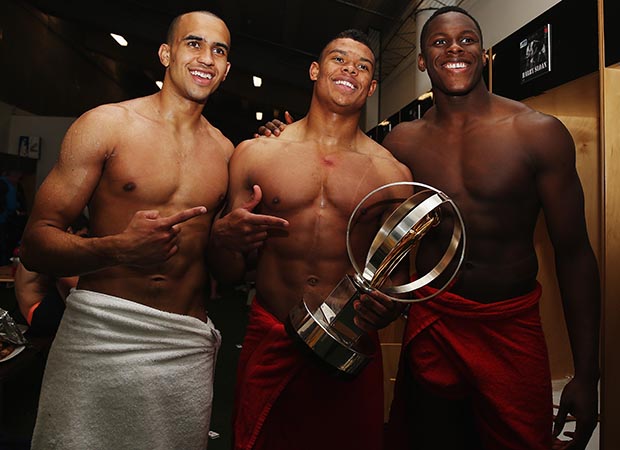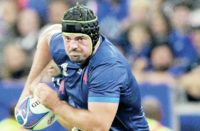 Nathan Earle says he is glad he was horizontal in bed when he got the news of his selection for the
Nathan Earle says he is glad he was horizontal in bed when he got the news of his selection for the
England tour party to Argentina, because it would have knocked him off his feet. Earle's shock inclusion among the 15 uncapped players picked for the two- Test summer series against the Pumas reflects Eddie Jones' quest to unearth young stars who can add something cosmic to his England squad ahead of the 2019 World Cup.
The 22-year-old Saracens winger says he shared the sense of surprise at his elevation to the top strata by the England coach ahead of renowned finishers like his club team-mate Chris Ashton, Bath's Semesa Rokoduguni, and Wasps Christian Wade.
“I was in bed at home – we had a day off, and I was just refreshing the phone to see if I'd made it.” Earle says it was as much a reflex as anything, and that he had no expectations his limited game time with Saracens.
“My initial reaction was disbelief – and then excitement. I haven't played a lot of Premiership rugby this season, but Eddie Jones called me later that day to congratulate me and tell me what is expected when I get into camp. It was more or less to train to the max and go for a Test place.”
That sense of excitement was still palpable when I met Earle after Saracens training this week. He started by telling me the call up was all the more precious because of the difficulties he has faced breaking through to the big time after becoming an England U20 Junior World Champion in 2014 in New Zealand alongside his Saracens mates Maro Itoje and Nick Tompkins.
Earle says that after finishing the Junior World Championship on a high and scoring six tries in five games – including one in the 21-20 victory over South Africa in the final – he had a troubled start to his pro career. It began when he suffered an Achilles tendon rupture at the start of the following season when he was on loan to Bedford.
“I did a full pre-season and snapped it in the first game of the season, away at Nottingham. It was terrible, and my immediate thought was that my career was done. It was not a clean break, and the specialists told me it was like a bomb had gone off, exploding the tendon. But the Sarries medical staff reassured me that people had come back from it, and credit to them for the rehab work they did with me because otherwise I don't think I would have made it.”
He continues: “It did not feel normal for about 18 months, but I was back playing after nine months, and initially it seemed weird.”
What was also weird was for Earle to be stuck on the sidelines while Itoje and Tompkins made rapid progress. “That was phenomenally difficult because Maro, Nick and I all signed for Saracens at the same time, and they are my best friends.
“Obviously, I was so happy for them, and now they have 50 plus appearances for Sarries – and Maro has skyrocketed to become an England regular and a 2017 Lion – but I was gutted for myself. I kind of felt that given the same opportunity I could have been in a similar position.”
 Earle says that it makes his England promotion all the more precious. “I'm unbelievably lucky to be going on this tour, and hopefully it will give me a better start to my senior career than I have had up to now.”
Earle says that it makes his England promotion all the more precious. “I'm unbelievably lucky to be going on this tour, and hopefully it will give me a better start to my senior career than I have had up to now.”
It is a chance he says he is determined to make the most of. “It must be a statement of intent from Eddie to be looking to the future. There are numerous players ranging from U20s to under 25s in the squad and it will be good to link up with the group of older players who have hundreds of caps between them. It's brilliant for me…the coach sees something, and I don't want to let his judgement down, and I want to do myself justice in the process.”
Ask Earle about what he can bring in Argentina and he responds: “Attacking rugby, and natural speed. If I blow my own trumpet, I'm quite quick – I've got the highest speed in the squad recorded in a game on the GPS. In broken field attacking I want to get my hands on the ball to create scoring opportunities for myself and others.”
Earle, who was born in Hong Kong and brought up in the Kent countryside near Maidstone where he went to school at Sutton Valence before becoming part of the Saracens Academy at Oaklands College in St Albans, says he gets his speed from his mother.
“She was a heptathlete and had opportunities to go further, but couldn't with me and my brother keeping her on her feet all day. That's where I get my physical pedigree because my dad was a prop back in Lytham,
Lancashire – so I didn't get it from him! Although he says he was ‘a very technical prop'.”
There was an early sign of his exceptional athleticism when, at 17, he played for Saracens against a star-studded Asian Barbarians side in Hong Kong, and marked it by scoring a scintillating try in which he skinned the All Black full-back, Mils Muliaina.
Earle puts a different slant on it. “I'd say he was so hungover in that game, and I was fresh as a daisy – I in-outed him, and then put the afterburners on. I lost my head a bit, because I was in awe of the guys we were up against, with All Blacks like Muliaina, Jerry Collins and Rico Gear, as well as Seilala Mapusua, Alesana and Henry Tuilagi, Nick Easter and Martyn Williams.”
It was not the last time Earle benefited from contact with New Zealand rugby, because last season he was given a new lease of rugby life thanks to a six-month stint in Christchurch which ended in him being part of the 2016 Canterbury side that lifted the Ranfurly Shield.
Last season had started with “a disappointing pre-season and limited game time”. Then Saracens director of rugby Mark McCall asked Earle if he was interested in heading to the Southern Hemipshere.
“I jumped at it, and as a life experience, and rugby experience, New Zealand was brilliant. I'd lost a bit of motivation and love for the game. I'd worked so hard to come back from the Achilles tendon injury, but not had much reward, and that was quite demoralising. The move got me loving rugby again, and I met some amazing people, and made life friends.”
Initially, Earle played for the Sumner club in the Christchurch league – but he was always on Canterbury's radar because McCall had hosted their Academy coach Scott Robertson when he was in the UK. It saw him selected in the Canterbury squad for the Mitre 10 Cup, New Zealand's leading provincial competition.
Earle takes up the story: “Playing amateur club rugby for Sumner was between English National One and Championship standard. The skill levels were far greater than in National One, but it was not as physical as the Championship because it is not a professional environment.
“With Canterbury the emphasis in training was massively different to what it is in England. All the rugby stuff was done in the morning because their main aim is to get the most out of every pitch session, and the gym sessions were in the afternoon – whereas it's the other way round here. There was also lots of running, and New Zealand are probably the fittest team in the world because of the tempo they want to play at.”
What Earle highlights next should be essential reading for the 2017 Lions, because it pinpoints why New Zealand are so dominant at the breakdown.
“They concentrate on micro-skills at the breakdown, where they are so technical and concentrate on how to get the ball out quickly. There is a difference in the level of detail. They look at how you enter into it, your body height, your hand placement, your foot placement, and how best to clear a man out of the ruck.”
He adds: “In rest periods Canterbury players are always doing little micro-skills with coaches, and never without a ball in their hands. Whether it's offloading, tackling, high ball skills, there is always something going on.”
Earle thrived to the extent that he became a regular in the Canterbury starting line-up, and finished with the rare accolade of being one of the few Englishmen to be part of a Ranfurly Shield-winning side, taking it off Waikato in an away challenge. The campaign ended on a triumphant note when Canterbury beat North Harbour in their first defence to finish the season as holders, and Mitre 10 champions.
Earle says it was invaluable to his development, and that he benefited hugely from working with Canterbury backs coach Joe Maddock, below left, who was formerly an outstanding wing for Saracens, Bath and the Crusaders.
“As a winger he was very clever, and had great anticipation. He taught me that this comes from concentration throughout the whole game, and I came back to Sarries able to read the game better.”
Even so, with international wingers of the calibre of Ashton, Sean Maitland and Chris Wyles on the Saracens roster, Earle has been limited to a few Premiership starts – including tries against Newcastle and Sale Sharks – and action in the Anglo Welsh Cup.
As Saracens eye a unique second European Cup and domestic double, Earle has his fingers crossed he will play a part. “I will be ecstatic if the coaches give me a chance in the big games. If not, I will train as hard as I can, get in the England camp in good shape, and hopefully get an opportunity on tour in Argentina.”
Nathan Earle's England selection might have been a bolt from the blue, but if the Saracens strike runner gets his way the Pumas could feel they have been hit by something just as powerful.


























